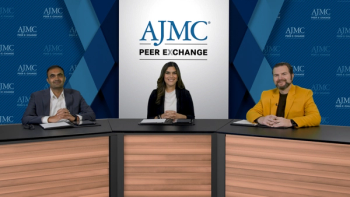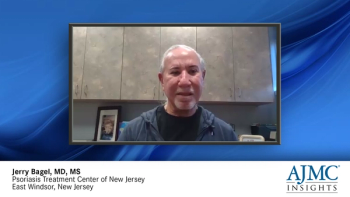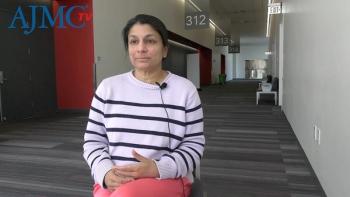
Clinical
Latest News
Latest Videos

CME Content
More News

Panelists discuss how social determinants of health significantly influence uncomplicated urinary tract infection (UTI) prevalence and outcomes, with patients with lower income, those from rural areas, and those lacking consistent health care access experiencing higher infection rates, delayed treatment, increased complications, and poorer overall treatment success.

Panelists discuss how their practices have observed an increasing trend in uncomplicated urinary tract infections (UTIs), particularly among younger adult women and those with recurrent infections, noting potential contributing factors such as antibiotic resistance patterns and delayed care-seeking behaviors.

The FDA first approved eculizumab for use in adult patients with generalized myasthenia gravis in 2017, before expanding the indication to include pediatric patients who are 6 years or older and positive for antiacetylcholine receptor antibodies.

These studies published in The American Journal of Managed Care® explored telehealth, care access, and patient experience during the COVID-19 pandemic.

Panelists discuss how health care institutions have established structured care pathways for nonspecialist providers to evaluate mild cognitive impairment and mild dementia, incorporating validated questionnaires, standardized screening protocols, and clear referral guidelines to ensure consistent assessment across diverse clinical settings.

Panelists discuss how health care institutions employ comprehensive screening protocols for Alzheimer disease, including cognitive assessments, biomarker testing, and regular monitoring of at-risk populations, to facilitate early symptom identification and timely diagnosis that enables prompt intervention and improved patient outcomes.

National MS Education and Awareness Month is celebrated each year in the US in March, after having been launched in 2003 by MS Focus: the Multiple Sclerosis Foundation and affiliated groups.

The role of artificial intelligence, DataDerm, and telehealth in advancing dermatology care was discussed throughout the meeting, with experts highlighting their potential regarding patient access and health equity.

Experts discuss which patient populations stand to benefit the most from recently approved bispecific therapies, identifying gaps or opportunities for further patient benefit, as well as the data gaps that exist in understanding the optimal use of bispecific antibodies across various cancer types.

A panelist discusses how guidelines are important for knowing when patient care starts, the progress of the patients care, and if the patient is satisfied with the response. Treatment guidelines are available for the 3 stages of hidradenitis suppurativa (HS): Hurley 1, Hurley 2, and Hurley 3. High scar scoring is also used to examine improvement in scarring over time. In real-world cases, guidelines have little to no impact on physicians treating HS, and most people often go to urgent care centers or primary care physicians when they are experiencing symptoms of HS. Health providers do not utilize guidelines except in clinical trials.

Experts discuss how the availability of bispecific therapies has influenced treatment paradigms in oncology and how bispecifics fit into current treatment algorithms for hematologic malignancies and solid tumors.

The 2025 Muscular Dystrophy Association Clinical & Scientific Conference, convening in Dallas, Texas, from March 16-18, will feature clinical updates, expert insights, and breaking trial findings that sum up to a new frontier of care for neuromuscular diseases.

These abstracts highlight the compounded challenges people with HIV face.

Flood exposure was more strongly associated with increased health care use and cost during the summer months and among Medicare beneficiaries aged 85 or older.

The authors argue that the stimulant shortage is being perpetuated by the overdiagnosis of attention-deficit/hyperactivity disorder (ADHD) in adults because executive functioning deficits are not included in diagnostic criteria.

This case study demonstrates how system-based tobacco cessation was enhanced in a community clinic.

This research on a T-cell–targeting vaccine in HIV has implications for future study design to incorporate consideration of age and years on antiretroviral therapy (ART) to evaluate the level of immune reconstitution.

Implementing a policy change to require preappointment surveys before scheduling initial clinic evaluations can improve wait-list times and show rates.

Older, generic medications, including ones for cyclosporine, nicotinamide, and dapsone, can effectively treat patients with various dermatological conditions while helping to reduce insurance and cost barriers.

A dietary fiber intake between 14.4 and 26.7 g reduced the risk of osteoarthritis, but an intake above this dose was not significantly protective.

Two posters presented at the 2025 American Academy of Dermatology Annual Meeting reaffirmed the impact of ruxolitinib cream (Opzelura; Incyte) in atopic dermatitis (AD), while late-breaking research highlighted its potential efficacy in prurigo nodularis (PN).

Amid limited access to pediatric dermatologists nationwide, pediatric patients of color with atopic dermatitis (AD) are particularly affected by social determinants of health, further impacting their outcomes.

Panelist discusses how health systems can improve communication and coordination among specialists through integrated care models and digital platforms. Centers of Excellence promote health equity by providing specialized care in underserved areas, reducing disparities. A unified approach ensures efficient, patient-centered care, enhancing outcomes for all.

This systematic literature review and pooled rates analysis investigated the standard of care for patients with heart failure in the US post hospital discharge.

Optimizing telehealth during public health emergencies to minimize in-person appointments puts less burden on patients and may lead to better outcomes, according to Chun Chao, PhD, MS, of Kaiser Permanente Southern California.
















